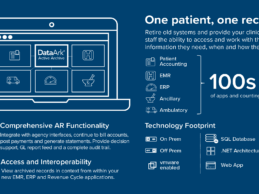Advances in conversational artificial intelligence are transforming basic chatbots into intelligent virtual assistants that provide comfort and utility for healthcare consumers and the healthcare organizations that serve them.
Most consumers have their minds made up about automated phone agents, and not too many people like them. Who among us hasn’t experienced the frustration of an automated phone menu when calling for a doctor's appointment or shouted “representative!” into our
Read More
Electronic Medical Records
Early Use of Diabetes Technology Drives Better Patient Outcomes in Kids
A recent study from Stanford found that pediatric patients with rapid access to continuous glucose monitoring soon after a type 1 diabetes diagnosis had healthier blood sugar values than an earlier group of patients who weren’t given the monitors near the time of diagnosis.
The research provides an example of how the healthcare industry is evolving to use technology: It provides more frequent touchpoints with caregivers, makes quality care available to a larger number of patients, and
Read More
Precision Medicine Startup Prenosis Raises $20M for Acute Care Solutions, Starting with Sepsis
What You Should Know:
- Prenosis, Inc., a precision medicine company, announced a venture investment from PACE Healthcare Capital, an early-stage investment firm committed to improving health outcomes. This investment brings total funding in the company to over $20 million, including partnerships with Foxconn, Roche Diagnostics, the Defense Threat Reduction Agency, and others.
- Precision medicine company will use the funding to
Read More
MediQuant® DataArk Awarded Project to Archive All Military Health Records
What You Should Know:
MediQuant®, a provider of enterprise active archiving and conversion solutions, has been selected by the US Defense Health Agency (DHA) to help consolidate all clinical data across the Military Health System as it transitions to a new enterprise electronic health records (EHR) platform by 2024.
- The contract to deploy MediQuant’s DataArk solution for the DHA “Genesis” rollout was secured by ECS, a leading provider of science, engineering, and advanced technology
Read More
Why The Future of Healthcare Interfaces is Fluid
Tools we use to do our daily work have rapidly evolved following deep human-computer interaction (HCI) research. However, when it comes to healthcare, the HCI research has not found its way to healthcare practice. Most healthcare professionals still rely on memory, experience, pen & paper and difficult-to-use healthcare software. The future of medical tools needs to be catalytic as opposed to a hindrance. In this piece, we attempt to untangle the set of tools used in healthcare today
Read More
Connecting the Dots – Building Data Bridges for a Better Healthcare Future
Healthcare data is increasing at an exponential rate. Approximately one-third of the world’s data volume is being generated by the healthcare industry. By 2025, the compound annual growth rate of healthcare data will reach 36% – that’s 6% faster than manufacturing, 10% faster than financial services, and 11% faster than media and entertainment.
In addition to information captured during visits with healthcare professionals, personal health information is being created by an increasingly
Read More
Why the Digital-First, Patient-Centered Care is Critical to Healthcare
In the turmoil of one of the hardest years the healthcare industry has experienced, many healthcare organizations innovated nearly overnight, transforming bedside tablets into virtual care providers and parking garages into field hospitals. Through the help of agile, flexible technology, healthcare has empowered providers to support patient care anywhere.
The pandemic created a tipping point: The healthcare industry must accelerate its drive toward a digital-first mentality.
Read More
Does Telemedicine Impede or Help the Patient-Centered Medical Home?
Traditional patient care patterns have been radically altered by the COVID-19 pandemic. And after more than a year of disruption, it’s doubtful that everyone will revert to those patterns after the pandemic.
New habits have been formed, and consumers are more willing to pursue the path of least resistance in obtaining care, such as opting for quick and easy telemedicine appointments. Both patients and clinicians have identified benefits from virtual care approaches.
However, this and other
Read More
Cardinal Health and Deep Lens Collaborate for AI-based Oncology Clinical Trial Matching
What You Should Know:
- Today, Deep Lens and Cardinal Health announced a strategic collaboration that will integrate Deep Lens’ AI-based clinical trial matching solution, VIPER, into community-based oncology practices throughout the Cardinal network. VIPER will be a part of Cardinal Health’s new Navista advanced suite of technology solutions designed to help oncologists improve outcomes, provide high quality care at the best possible cost and select the right care plan at the onset of
Read More
How NLP Can Uncover Social Determinants of Heart Disease
Heart disease is the leading cause of death for people of most racial and ethnic groups in the United States. Cardiovascular disease-related deaths—which occur every 36 seconds—cost our country about $219 billion each year, according to the Centers for Disease Control and Prevention (CDC). People with poor cardiovascular health are also at increased risk of severe illness from COVID-19, so the time to act is now. There’s no time like the present to look at major risk factors—from obesity and
Read More










